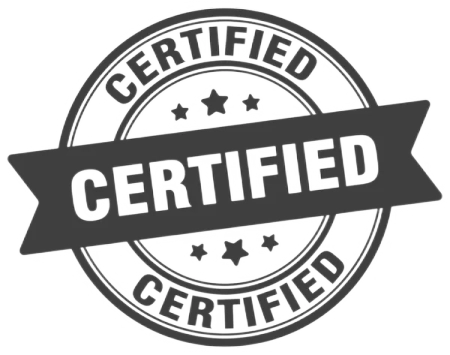Home » Industry Expertise » Bookkeeping For Transportation and Trucking
Experience Hassle-Free
Bookkeeping For Transportation and Trucking
With over 9+ years of experience, we are a trusted partner for accounting and bookkeeping services in the US. Whether you’re a startup, a small business, or an established enterprise, our services can meet the unique needs of your industry. Our deep understanding of US regulations and best practices can empower your financial journey and drive you toward long-lasting success!
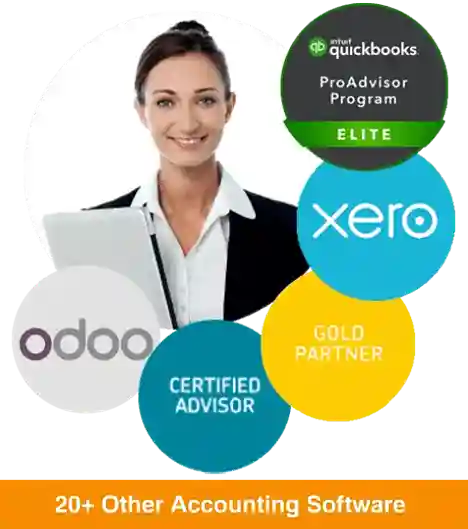
Bookkeeping and accounting for manufacturing business in the US
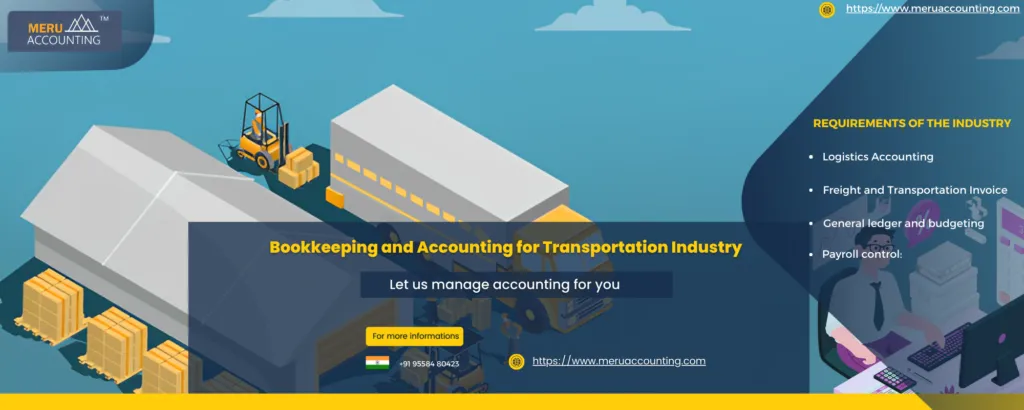
- Bookkeeping is an essential part of any business, including those in the accounting and transportation industry. The accounting requirements of each industry stand to be different and have some special accounting characteristics. When we talk about Accounting for the Transportation and Trucking Industry, it attracts lots of freight bills, invoices, receivables, etc. and thus it’s very important to treat these accounting needs deliberately.
- Here are some key things to keep in mind when it comes to bookkeeping in these industries:
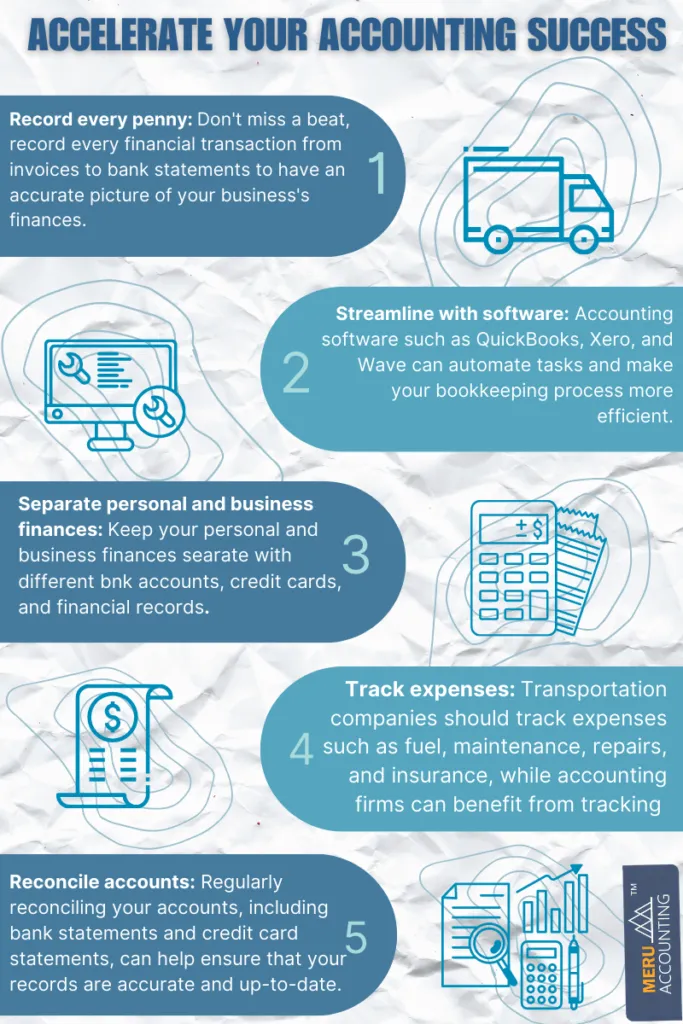
Requirements Of The Industry
- Following are some typical terms to be taken into consideration for the Accounting of the Transportation and Trucking Industry.
- Apart from all these services, we at Meru Accounting also take care that a business matches the industry benchmark. We also do the KPI management accurately.
Accounting software used in the transportation industry?
There are several accounting software options available for the transportation industry, depending on the specific needs of the business. Some of the popular accounting software used in the transportation industry include:
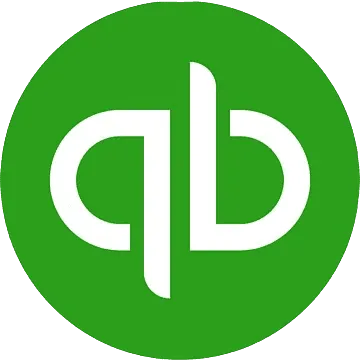
QuickBooks
QuickBooks is a popular accounting software used by many transportation companies. It offers features such as invoicing, expense tracking, and inventory management.

Xero
Xero is another popular accounting software that is widely used in the transportation industry. It offers features such as expense tracking, invoicing, and bank reconciliation.
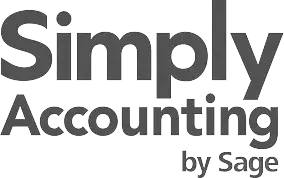
Sage Intacct
Sage Intacct is a cloud-based accounting software that offers features such as accounts payable, accounts receivable, and financial reporting.

FreshBooks
FreshBooks is a popular accounting software that is widely used by small transportation companies. It offers features such as invoicing, expense tracking, and time tracking.

NetSuite
NetSuite is an enterprise-level accounting software that is used by many large transportation companies. It offers features such as financial management, inventory management, and order management.
Tips for managing bookkeeping in the transportation industry?
Managing accounting in the transportation industry can be complex, but here are some tips that can help:
- Keep accurate records: Make sure to keep track of all your financial transactions, including expenses and revenue. Keep receipts and invoices organized and up-to-date.
- Use specialized accounting software: There are several accounting software options designed specifically for the transportation industry, which can help streamline accounting processes and reduce errors.
- Monitor fuel expenses: Fuel costs are a significant expense for transportation companies. Monitor fuel prices, usage, and efficiency to identify cost-saving opportunities.
- Track maintenance costs: Vehicles and equipment used in the transportation industry require regular maintenance and repairs. Keep track of these costs to ensure they are properly accounted for.
- Stay on top of regulatory compliance: The transportation industry is subject to various regulations, such as those related to fuel taxes and environmental standards. Ensure that you are in compliance with all relevant regulations to avoid penalties.
- Consider outsourcing: Consider outsourcing accounting tasks to a professional accountant or accounting firm that has experience in the transportation industry. This can help ensure accuracy and free up time for other important tasks.
- Regularly review financial statements: Regularly review financial statements, such as income statements and balance sheets, to track performance and identify areas for improvement.
By implementing these tips, you can help ensure that your transportation business’s accounting is properly managed and optimized for success.
Streamlining Fleet Accounts For Efficiency
- In today’s fast-paced transportation industry, it is more important than ever to ensure that fleet accounts are managed as efficiently and effectively as possible. Streamlining these processes can lead to significant time and cost savings, allowing businesses to focus on their core operations and ultimately improve their bottom line. One of the key aspects of achieving this efficiency lies in proper bookkeeping practices.To begin with, it is crucial for businesses to invest in a comprehensive bookkeeping system tailored specifically for the transportation sector. This can help automate many of the day-to-day tasks involved in managing fleet accounts, such as tracking fuel consumption, monitoring vehicle maintenance schedules, and allocating expenses. By automating these processes through a dedicated system, valuable time can be saved that would otherwise be spent manually inputting data or trying to make sense of complicated spreadsheets.
- Another essential aspect of streamlining fleet accounts involves implementing effective policies and procedures for expense management. Businesses should clearly outline which costs are allowable under company guidelines and provide employees with easy-to-use tools for recording their expenses accurately. This not only helps maintain financial control over company spending but also ensures compliance with tax regulations.Moreover, staying up-to-date on changes in tax laws affecting the transportation industry is vital when it comes to efficient bookkeeping practices. Companies must ensure they’re taking advantage of any available credits or deductions while adhering to all relevant filing requirements—failure to do so may result in costly penalties or missed opportunities for savings.
- Additionally, regular financial reporting plays a key role in maintaining efficiency within fleet accounts management. By providing stakeholders with accurate and timely information about company performance—including data on costs per mile driven or average revenue per vehicle—businesses can make informed decisions about where improvements may be needed within their operations. Lastly, investing in ongoing staff training is another important element of streamlining fleet account processes. Ensuring employees have access to appropriate resources—including seminars or workshops focused on best practices within the transportation industry—can help boost their knowledge and skills, allowing them to more effectively manage fleet accounts and contribute to overall company success.
- In conclusion, by taking a proactive approach to managing their fleet accounts, transportation businesses can enjoy the benefits of increased efficiency, reduced costs, and better compliance with industry regulations. By implementing best practices in bookkeeping specifically tailored for the transportation sector—such as investing in comprehensive systems or staying up-to-date on tax laws—companies can set themselves up for long-term success in an increasingly competitive market.
Logistics Accounting Best Practices
- In the ever-evolving world of transportation, logistics accounting plays a pivotal role in keeping businesses on track and ensuring optimal financial performance. With the rapid growth of this industry, it has become imperative for companies to adopt best practices in order to stay ahead of the curve and maintain a competitive edge. This is particularly true when it comes to bookkeeping, as efficient and accurate financial record-keeping is essential for informed decision-making and overall business success. One of the foremost best practices in logistics accounting is implementing an integrated software system that caters specifically to the needs of the transportation industry. Such systems not only streamline data entry but also facilitate seamless communication between various departments, such as operations, billing, payroll, and more. This holistic approach ensures that all aspects of your business are working together cohesively while reducing the potential for errors or miscommunications.
- Another key aspect of effective logistics accounting lies in maintaining detailed records pertaining to every transaction within your organization. This includes keeping accurate documentation for all expenses incurred – from fuel costs to vehicle maintenance – as well as diligently recording revenue generated from each shipment or service rendered. By having this information readily available at your fingertips, you can easily analyze trends over time and make data-driven decisions that will propel your business forward.
- Moreover, regular reconciliation is essential when it comes to maintaining accurate financial records within your logistics business. By cross-referencing bank statements with internal ledgers on a monthly basis (or even more frequently), you can quickly identify discrepancies or potential issues before they snowball into larger problems down the line.
- In addition to these core principles, fostering strong relationships with both clients and vendors should be considered a top priority within any successful transportation company’s bookkeeping strategy. Promptly issuing invoices after services have been rendered not only demonstrates professionalism but also ensures that you’re adequately compensated for work completed; likewise, timely payments made to suppliers help maintain positive rapport while avoiding unnecessary late fees or other penalties.
- Lastly, don’t be afraid to seek external guidance when it comes to optimizing your logistics accounting processes. Enlisting the expertise of a professional accountant who is well-versed in the nuances of the transportation industry can provide invaluable insights and help identify areas for improvement within your existing financial management strategies.
- By adhering to these best practices, you’ll be well on your way to establishing a solid foundation for financial success within the ever-competitive world of transportation and logistics.
- In summary, transport bookkeeping is an essential aspect of the transportation industry that ensures efficient management of fleet accounts, vehicle finances, logistics accounting and shipping records. By implementing effective systems and practices in these areas, businesses can better track their financial performance and make informed decisions for future growth. Ultimately, investing in proper transport bookkeeping not only leads to streamlined operations but also contributes to the overall success of any organization within the transportation sector.
Hiring Virtual Accountant With Meru Accounting
Meru Accounting provides world-class services that cater to all the needs of cloud accounting and bookkeeping of your business.
We work on the best accounting software like Xero and Quickbooks, as well as add-ons that will make sure all your work is up-to-date.
We also manage VAT, BAS, Sales Tax and Indirect taxes for you so you are always ready at the end of the financial year.
Help you with switching from your traditional software to Xero and Quickbooks.
- Cost-saving.
- Access to skilled and experienced professionals.
- Better management of books of accounts.
- Decreased chances of errors.
- Improve business efficiency.
- De-burdens in-office employee’s dependency.
- Better turnaround time.
We work on virtual technologies like Team Viewer, Virtual Private Network (VPN) to share and access data from your system.
You have to share your accounting software login details.
Through that, we complete all of your work and update it on the cloud, so you can have access to your data from anywhere and at any time.
Software is not a barrier for us. Due to our strong and professional accounting knowledge, we can prepare your books in almost any of the accounting software
Our experts are always all ears to listen to your queries regarding bookkeeping and accounting or our services. You can contact us anytime by visiting: Contact Us page.
We provide our bookkeeping services at the rate of US $10 per hour. So, you only need to pay for the amount of time actual work is done.
We take certain preventive measures to secure your data, like:
- Cyberoam Firewall to prevent any kind of foreign threat.
- Dual-step authentication
- Implement anti-virus
- Limit user access so that login details are with a few people.
Meru Accounting work on some of the best accounting software’s like:
- Xero
- Quickbooks
- Netsuite
- Saasu
- Wave
- Odoo
Along with that, we also work with many add-ons like Workflow Max, Receipt Bank, Slack, TradeGecko etc., to extend your software’s capacity and improved work experience.
To book for trial, call us on our numbers or Please fill out the form here.
Our Work Information
We have combined team of Professionals. Seniors are generally Certified Chartered Accountants. Junior Bookkeepers are having Qualifications like Bachelors of Commerce, Masters of Commerce, Masters in Business Administration in the subject of Accounts and Finance, Intermediate level Qualification of Chartered Accountancy, etc.
For information visit our work methodology page.
We prepare a checklist of information required for bookkeeping and send you at timely intervals so as to ensure that we can do bookkeeping faster.
We can provide to you once we move ahead in our interview.
We serve clients on MYOB and have expertise working in Essentials, Account Rights Plus, etc.
Yes, We are presently processing Payroll for Number of clients in US , UK and Australia and take care of complete payroll activities.
Goods and Service tax (GST) is levied on sales of all the goods and services in Australia. GST is generally chargeable at 10% of value of sales.
Business Activity Statement is a predefined form to be submitted to the Australian Tax office by all the business persons in order to report on their all the tax obligations during the period covered.
BAS is generally required to be filed quarterly by various businesses.
Individual Business Owners
Yes, Owner of the business can prepare sign and lodge the tax return on his own. Its not mandatory that the Tax return needs to be signed by an EA or CPA.
No , its not mandatory that it should be prepared by only CPA or EA. It can be prepared by anyone who has PTIN.
We have Enrolled Agent who has the Authority to sign the documents for our clients after completing the through professional check.
Meru Accounting has its operational centre in India and hence the prices are quite less as compared to US based CPA’s and Enrolled Agents.
Meru Accounting has a team of Tax experts. Each Tax expert prepares around 300-400 Tax returns every year for various CPA’s in United States and Individual Businesses like yours. Due to this vast Experience and Robust Quality Check processes in place we can ensure you about correct Tax planning for your firm.
Get a Free Quote
CONTACT US FOR ANY QUESTIONS






